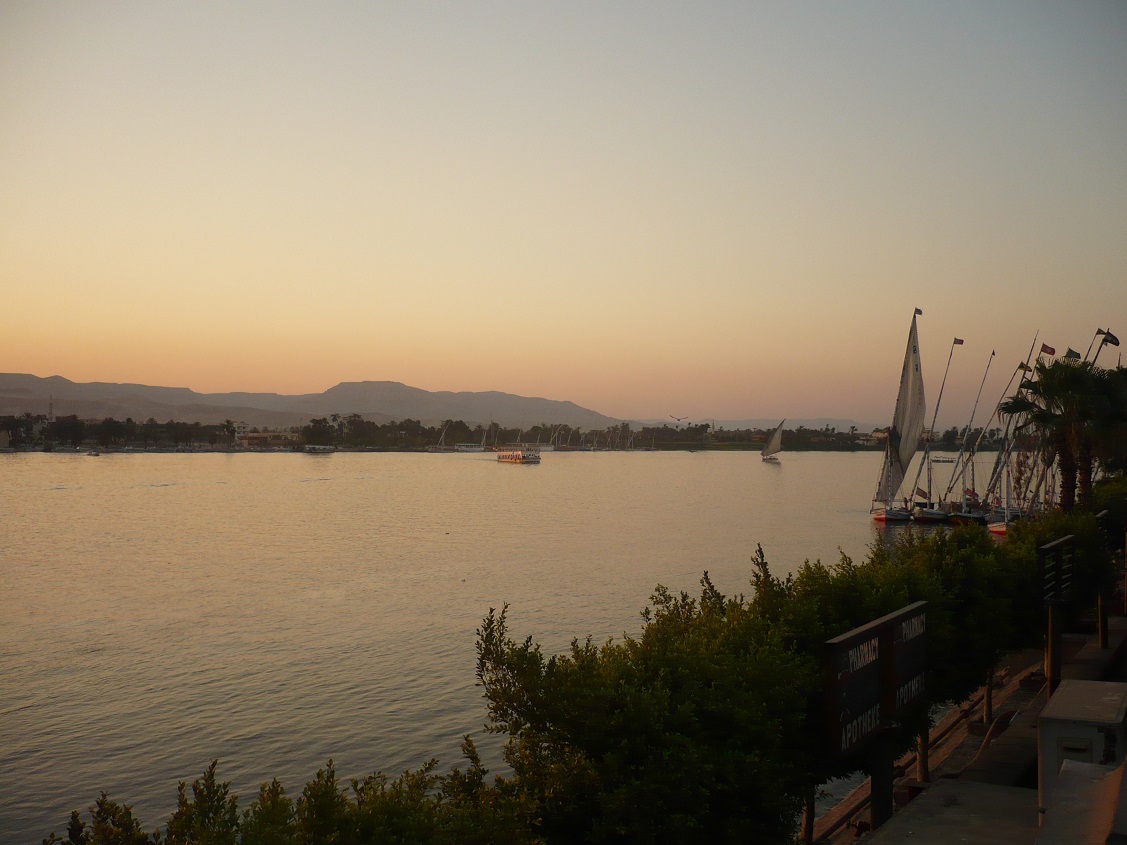
Surrounded by desert, the ancient Egyptians depended on their intimate knowledge of the Nile River’s ever changing flow for survival. The river’s natural flood cycles fertilized the land and made it suitable for growing crops. The Nile is shown here as it flows through present-day Luxor, the site of the ancient Egyptian city of Thebes. Photo Credit: Henry Lewis
I’m obsessed with history and archaeology. For me, there’s a fascinating mystique that surrounds the exploration of advanced ancient cultures from the early Egyptians and Sumerians to the later New World Mayas and Incas. One thing they all had in common was a deep respect for the natural world that sustained them.
Try to imagine the innate knowledge ancient humans once possessed; the kind of skills and oneness with nature that was required for groups to navigate their way from one continent to another during the last Ice Age. These early explorers depended more on their knowledge of and continuity with nature than on the primitive technologies that were available at that time. Where is such intuition today?
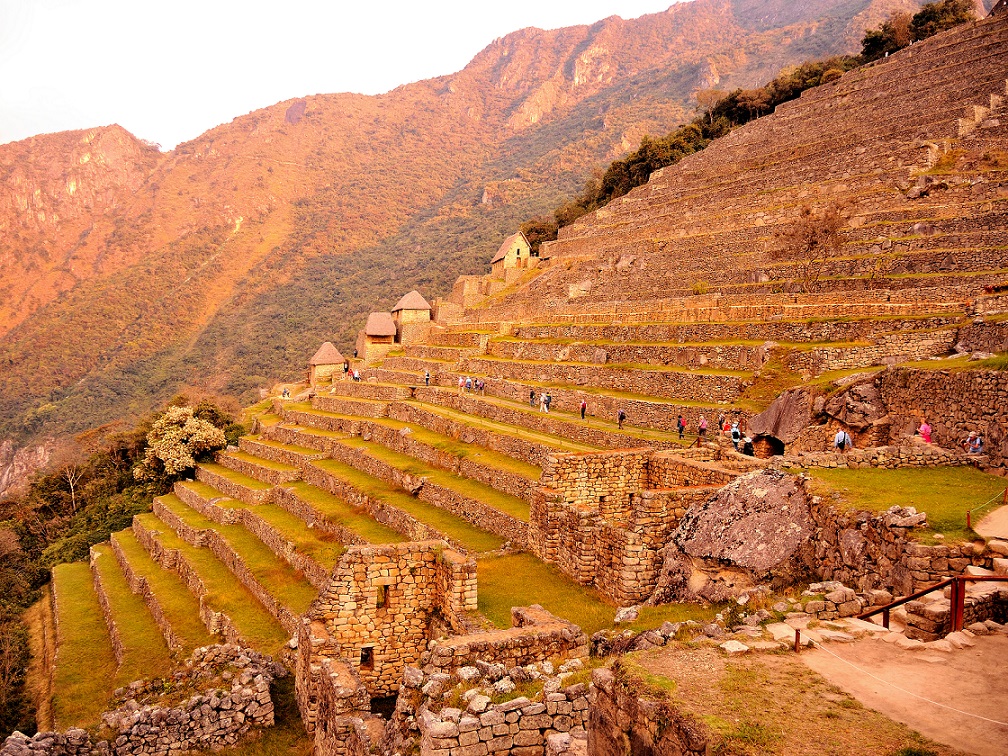
The Inca civilization developed sophisticated engineering projects based solely on their unique knowledge of their mountainous environment. They used extensive terracing to stabilize the land, add warmth and hold water run-off for growing the food needed to sustain remote settlements such as Machu Picchu, pictured here. Photo Credit: Henry Lewis
The only navigating skills many modern humans seem to have is the ability to use GPS to find the nearest Walmart or shopping mall. Our dependence on science and technology has not only separated us from the rhythms of the natural world, it has been responsible for the loss of our primal connections to nature itself.
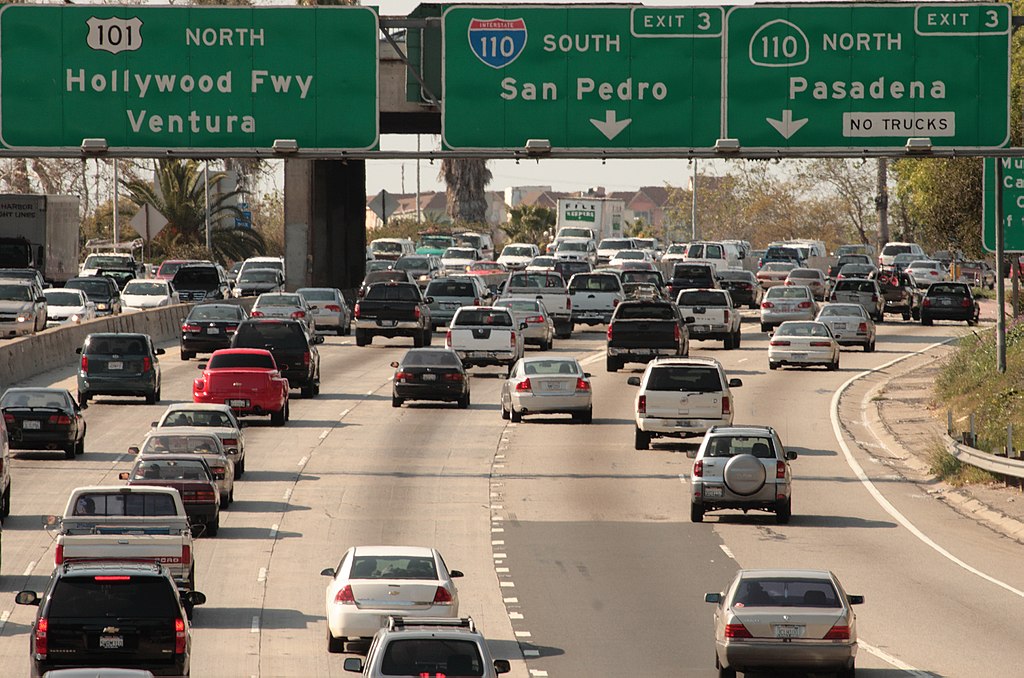
Most American cities, such as Los Angeles pictured here, operate in a wasteful way, using energy and space inefficiently. Photo Credit: Myriam Thyes.
Our modern world
Ahhh, modernity! We’ve created quite a life for ourselves, haven’t we? Many of us share the blessings of seemingly unlimited possibilities due to advancements in communications, mobility and purchasing power. We rush from one scenario to another with barely a thought about the effects our actions are having on the world at large.
Whether its vast swathes of tropical rain forest being cleared for palm oil plantations (to satisfy Western tastes in food and beauty products) or the environmental degradation being wrought in order to manufacture all the disposable conveniences we take for granted, the results are the same: our collective lifestyle choices are having a dramatic negative impact on our planet.
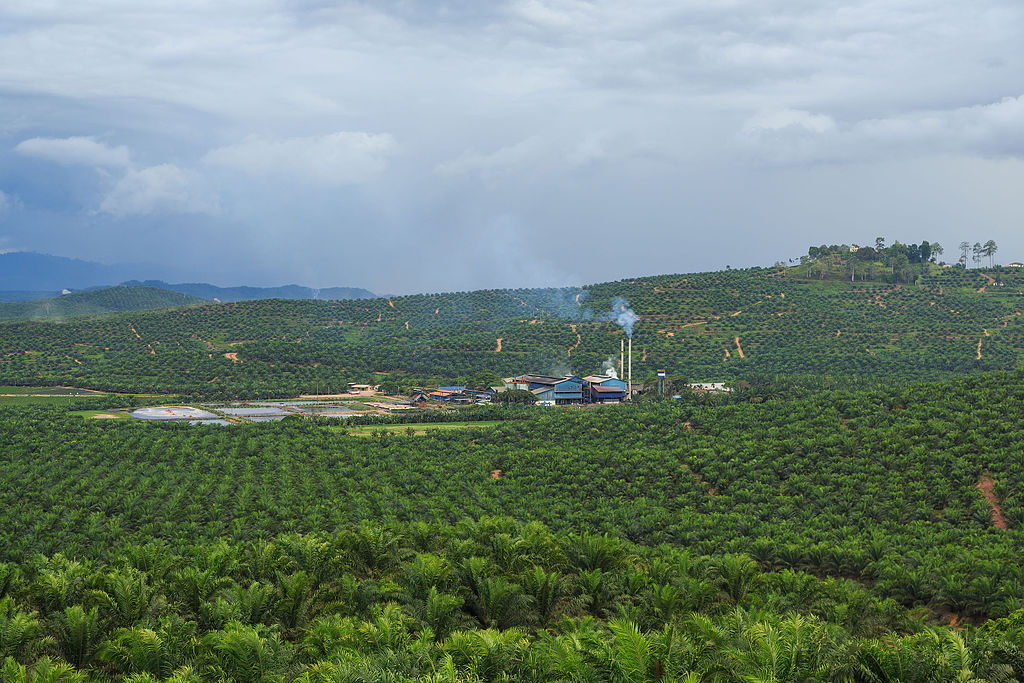
In many equatorial regions, lush rain forest has been replaced by vast palm oil plantations, destroying the endemic ecosystem of plants and animals. This photo shows one such plantation in the Malaysian state of Sabah on the island of Borneo. Photo Credit: CEphoto, Uwe Aranas.
Simply put, modern humans have become arrogant, especially when it comes to living in harmony with nature. We expect something (or someone) else to save us from our wasteful ways because we don’t want to change our daily habits. Trust me, I get it. I fight the same daily battles with my own expectations and desires.
We smugly say to ourselves that technology has always come to our aid in the past when we were standing on the edge of a precipice? When we needed vaccines to halt the spread of killer diseases, voilá!, science provided them.
When populations expanded more quickly than farmers’ ability to produce enough food, scientists developed new methods of agriculture which allowed higher crop yields from the same piece of land. Think of the Green Revolution of the 1960s which produced a spate of new chemical fertilizers that increased crop yields that in turn helped feed burgeoning populations, especially in countries such as India.
However, depending solely on science and technology to save us from ourselves isn’t necessarily the panacea we might envision.
Unfortunately, decades after the Green Revolution began, many of the areas that benefited most from those scientific advancements now suffer from a lack of water due to overuse of irrigation and the poisoning of wells by a variety of those once miraculous chemicals. Sometimes science and technology solve one problem while creating another.
“Everything in excess is opposed to nature.” Hippocrates
Business as usual
Perhaps it’s all simply a plot cooked up by governments and mega corporations to keep their revenues flowing. The culture we exemplify encourages our short-sighted, wasteful behavior which in turn gives the corporations a mandate to invent new products and services that simply place a bandage over the problems we’ve created.
Just as the pharmaceutical companies know there’s a lot more money to be made by producing medications to treat disease symptoms than finding cures, our wasteful habits are encouraging the new remedies continually coming down the pipeline. Whether deliberate or not, it’s a continuous cycle few at the top of the food chain want to see change.
It’s sad that modernization has turned us into such short-sighted creatures. In our daily rush to complete our list of tasks, we’ve lost sight of the bigger picture. If we continue along the same fossil fuel burning–cut down the rain forests–consume everything in sight trajectory, we will be responsible for the demise and ultimate extinction of our species.
Sure, you say, but that probably won’t happen in my lifetime, so why should I care? I work hard, so dammit, I’m going to enjoy the fruits of my labors–whatever money can buy, the sky’s the limit and all those famous refrains. Honestly, I believe in living in the moment too, but as a state of mind, not as a nose thumb to our planet.
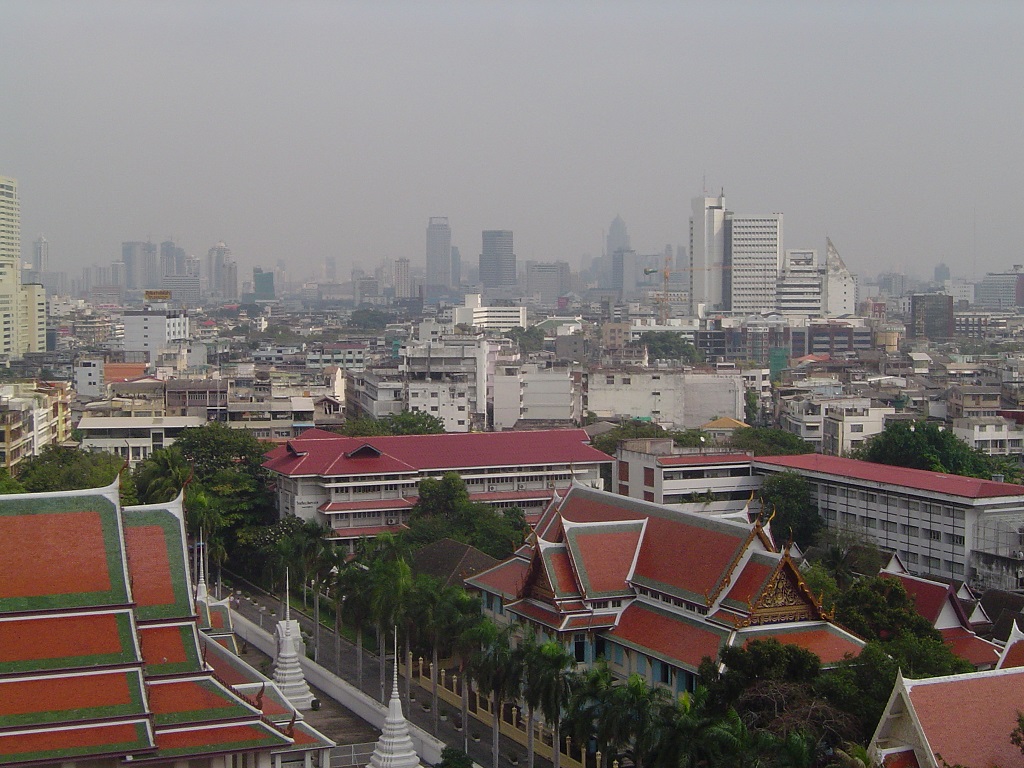
Air and water pollution plague many of the world’s cities. They are the by-products of our modern, wasteful lifestyles. Car-dependent Bangkok, pictured here in a haze of air pollution, is just one of many Asian cities choking on it’s own success at drawing new residents who are looking for a better life. Photo Credit: Henry Lewis
In addition, we’ve burdened the Earth with too many other little consumption machines just like ourselves. Birth rates in many countries may be falling, but overall world-wide population is predicted to increase from the current 7.3 billion to 9.7 billion by 2050.
The bulk of the increase will take place in South Asia and Africa, regions already reeling from water and food supply shortages. Will it be possible for the billions now living much more frugal lives to be able to reach the same levels of prosperity we in the West enjoy? And if not, how can we in good conscience tell them they aren’t allowed to adopt the same lifestyles, no matter how hard they’ve worked?
We need to admit to them (and to ourselves) that such wasteful lifestyles aren’t sustainable and thus not the way forward if we want future generations to flourish.
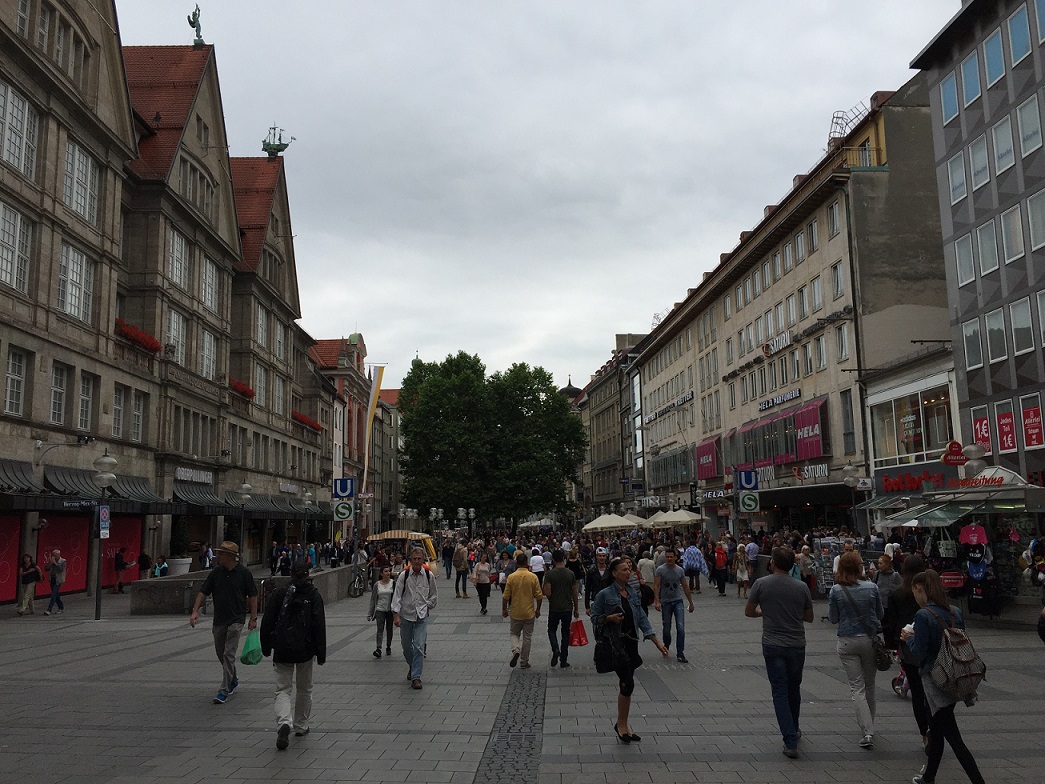
Many European cities, such as Munich pictured here, are more compact and efficiently designed for mass transit, cycling and walking. European city centers often have pedestrian only areas which are perfect places for exercising, meeting friends and enjoying cleaner air and less traffic noise. European cities produce far fewer greenhouse gases, on a per capita basis, than their American counterparts. Photo Credit: Henry Lewis
We must bring about positive change
We need to change our short-sighted desire for instant gratification and wake up to the fact that long-range planning would be far wiser. And yes, that means negotiating and working closely with other world governments. We can no longer afford to ignore the fact that all our fates are crossed, not only economically, but physically as well. What happens in one world capital has major repercussions in many others as well.
I appreciate scientific endeavor and the benefits new discoveries and technologies provide for us, and I’m certainly not advocating a return to the Stone Age. However, I am promoting collective, positive change—the kind that can only come when we accept responsibility for our actions. [read more in my post Making a Commitment to Sustainability]
It no longer makes sense for us to drive individual cars and trucks anywhere and everywhere we choose, nor does it make sense to continue building grand air conditioned shopping malls and fancy hotels with lakes, dazzling fountains and golf courses in hot desert zones where it rarely rains.
Isn’t it time we seek to regain some of the ancient wisdom and respect for nature humans once possessed?
Think about it.
peace~henry



How wise was Hippocrates! Thanks for sharing.
LikeLiked by 1 person
Hi Jane,
Yes, we do own a debt of gratitude to many Greek philosophers for their wise words. Thanks for commenting!
LikeLike
I agree with you one hundred percent. I don’t know if today’s generation of children even think about the fact that they live on the earth and that the earth provides what they need to survive. They are too busy taking pictures of themselves, or looking at a screen. Like the cartoon where the parents are looking at the Grand Canyon and the kids are in the car looking at a picture of the Grand Canyon. Major disconnect. It used to be hands on, now it’s eyes on. I definitely agree that not giving us cures is completely due to greed, just like everything else. Greed is the only thing that matters nowadays. I don’t know how to change things. I do believe that if we actually try and make a difference, our own government will attack and even kill us. I don’t know if we can be saved from extinction and on the way to that end, I think things will be very, very ugly.
LikeLiked by 1 person
I try to remain hopeful that humans have the capacity (and will gain the awareness) for positive change. However, based on what I see happening in much of the world both environmentally and politically, that dark future scenario you mention seems all too possible to me. I read on BBC about the climate change protesters in London blocking some of the main bridges that cross the Thames in an effort to make their voices heard. Somehow, simply disrupting traffic seems like a desperate attempt to tilt at windmills. But, I think we all must do whatever we can to make our voices heard on the critical topics of climate change and sustainability. Thank you so much for sharing your thoughts and being an important part of the discussion!
LikeLike
The old ways of protesting aren’t working because the people in charge no longer care what the people think or want. Marches and demonstrations used to mean something. No one is listening any more. That’s part of the problem. We need to do bigger things or things in a different way. Ways that upset their greed. Thee is no common good, no we the people, thee’s just greed men at the top who want more at any cost.
As protesters, the names on petitions are meaningless, so are the numbers. We need new strategies and ways of boycotting where it hurts them in the pockets because that’s ALL they understand. The problem is getting people to work together to make any kind of difference. We have been isolated and kept apart for a reason. The hate spewed out of washington is like a blanket of violence and unrest. We need to stop watching the news and start working together but I don’t see that happening any time soon and we are running out of time, or maybe we already have.
LikeLiked by 1 person
I totally agree that those at the top could care less what the masses think at this point. They have their luxurious hidden bunkers well-supplied and are prepared for a time when civil unrest consumes the planet. My only question is: Why would anyone choose to live in a world of destruction when there’s a clear choice. Again, for me it goes back to losing our primal connection to nature and the value of non-material things in life such personal relationships.
Indeed, new strategies to fight such manipulation are needed. I made a statement by leaving the USA in early 2003 when the Iraq War began. I was in the streets of Seattle protesting for weeks, but our numbers finally dwindled to under 1000 as the police tightened the rules for protesting and everyone else had gone back to business as usual. In 2010, I had the opportunity to teach in Iraq and I got to see first-hand the human toll the bloody conflict had on Iraqis (and it’s still true today). That series of events, along with my experiences working in a variety of other countries has been evidence that what you say is true.
In the end, the game has always been about the methods the power elite use to control the masses, but now the stakes have been raised considerably.
Thanks again for being part of this discussion!
LikeLike
I think small steps by individuals, each person reducing waste and choosing less polluting transportation is a good start. I think that people need to organize to create the momentum to make more significant change. I think articles like Henry’s help promote awareness and snap us out of our holiday consumer bubble to think of simple changes we can enact. Make one gift instead of buying one, perhaps, or buy resale merchandise; take a friend to lunch or a movie instead of buying an object. -Rebecca
LikeLiked by 1 person
Hi Rebecca,
Those are excellent ideas to consider here at the beginning of the holiday season. I must say that I grew up with exceptional parents that taught us the joy of true giving and how to live a frugal lifestyle with less waste. When I was 11 years-old, my parents decided–in consultation with me and my 2 older siblings–that we would no longer exchange gifts as a family. Instead, each Christmas we adopted a family in need and took Christmas to them. It was a turning point in my life and taught me the true meaning and value of giving to others. I wish there were more people like my parents still living in today’s world. Thanks so much for sharing your thoughts!
LikeLiked by 1 person
What an amazing tradition. Hats off to them! Truly remarkable. -Rebecca
LikeLiked by 1 person
I think we’re destroying ourselves and are dragging down everything with us
LikeLiked by 1 person
Hi Flavia,
I feel the same way, but I still have hope that more humans will wake up and take responsibility for the mess we’re creating. Thanks for reading and commenting!
LikeLike
In my humble opinion we had the time to do something at least 20 years ago. Now the time is over but you and I will never know. Only future generations could tell…
LikeLiked by 1 person
Very comprehensive article, Henry. Thank you.
Change we must, if we are to survive as a species on Planet Earth.
LikeLiked by 1 person
Hi Rosaliene,
Thanks so much for your comment. I suppose the most we can do is to continue making our voices heard and to try to live as an example of good Earth stewards.
LikeLiked by 1 person
Everyone does what they can but unless we work together…sadly, it won’t be enough.
LikeLiked by 1 person
True. Here’s an interesting link to Phil Ebersole’s blog post entitled ‘liquid modernity’ where he presents the ideas of the late Polish philosopher Zygmunt Bauman.
https://wordpress.com/read/blogs/11655740/posts/81319
LikeLike
ALWAYS INFORMATIONAL AND THOUGHT PROVOKING – AND MOST OF ALL SOBERING – HOPEFULLY TO THE POINT OF OUR MAKING CHANGES BEFORE TOO LATE.
LikeLiked by 1 person